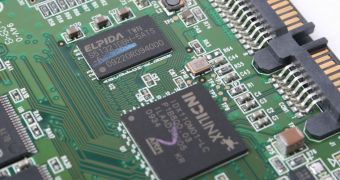In an interesting turn of events, it was reported today by Anandtech that OCZ’s new SSDs, the ones using the so-called Indilinx chips are, in fact, using rebadged Marvell controllers.
It was quite an achievement for OCZ to be able to launch a new SSD controller so fast after the acquisition of chip designer Indilinx. The first Everest was a very good performer which, though not excelling in any particular area, fared well overall and came with no downsides.
Octane reminded us of Crucial’s m4 series, but nothing prepared us for what we’ve just found out. The Indilinx Everest controller and Marvell’s controller powering the m4 series are one and the same.
We were surprised that OCZ representatives were so quick to acknowledge this but, immediately after the news broke out, they’ve confirmed it with the mention that Everest is a higher clocked version of Marvell’s 88SS9174.
The higher clock is not the only difference, nor is it the most important. The biggest difference is OCZ’s custom firmware that made the drives behave so much differently.
Developed entirely by Indilinx, the firmware has proven that Intel was right saying that the value of an SSD is not as much in the controller silicon, but in the firmware design and validation.
Therefore, this brings us to another pressing question: what about Everest 2? This controller shocked everybody with its good performance, and the thing that amazed us the most was OCZ’s ability to bring it to the market just months after the launch of Everest 1. Could it be that Everest 2 is, in fact, Marvell’s next generation controller, the 88SS9187?
If the controller in Vertex 4 is Marvell’s 88SS9187 with Indilinx’s firmware, then why isn’t Intel, with its huge software division and, most likely, the biggest R&D funds in the chip hardware business, able to bring to the market some real competition to the SandForce drives at least?
Competing with Marvell's 88SS9187 and OCZ's firmware seems to be totally out of Intel's reach.

 14 DAY TRIAL //
14 DAY TRIAL //